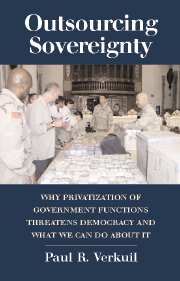 Outsourcing Sovereignty
Outsourcing Sovereignty Book contents
- Frontmatter
- Contents
- Acknowledgments
- Chart
- 1 Introduction and Overview – Why Outsourcing Threatens Democracy
- 2 The Outsourcing of Sovereignty
- 3 Case Study: Public and Private Approaches to Transportation Security
- 4 The Public-Private Distinction
- 5 The Case for Constitutional Governance
- 6 Statutory and Administrative Limitations on Private Delegations
- 7 Outsourcing Government Services: Contract Theory and Practice
- 8 Structural Reforms to Government
- 9 Conclusions (Wherein the Principal Instructs Her Agents)
- Cases
- Bibliography
- Index
4 - The Public-Private Distinction
Published online by Cambridge University Press: 27 July 2009
- Frontmatter
- Contents
- Acknowledgments
- Chart
- 1 Introduction and Overview – Why Outsourcing Threatens Democracy
- 2 The Outsourcing of Sovereignty
- 3 Case Study: Public and Private Approaches to Transportation Security
- 4 The Public-Private Distinction
- 5 The Case for Constitutional Governance
- 6 Statutory and Administrative Limitations on Private Delegations
- 7 Outsourcing Government Services: Contract Theory and Practice
- 8 Structural Reforms to Government
- 9 Conclusions (Wherein the Principal Instructs Her Agents)
- Cases
- Bibliography
- Index
Summary
The distinction between public and private law thus varies in meaning depending upon whether it is criminal law or administrative law that one wishes to separate from private law. The distinction is useless as a common foundation for a general systematization of law.
– Hans KelsenIf the law is a jealous mistress, then the public-private distinction is like a dysfunctional spouse – you can't live with it and you can't live without it. It has been around forever, but it continues to fail as an organizing principle. Still, as Ronald Moe urges us to remember, it was “the Framers' intention that the governmental and private sectors be kept separate and subject to distinct theories of jurisprudence.” In fact, the distinction makes an enduring point for democratic societies: The separation of public from private creates the space necessary for individualism to flourish. And, in case we forget the lesson, the definition of fascism confirms it by assuming the dominance of the community or the hegemony of the public. It is the presence of public law, what the great English legal thinker A. V. Dicey called the law of the Constitution, that mediates the line between the two regimes in the democratic, rule of law-bound, state.
The public-private distinction and democratic political theory have an inevitable role to play in the context of privatization.
- Type
- Chapter
- Information
- Outsourcing SovereigntyWhy Privatization of Government Functions Threatens Democracy and What We Can Do about It, pp. 78 - 101Publisher: Cambridge University PressPrint publication year: 2007


